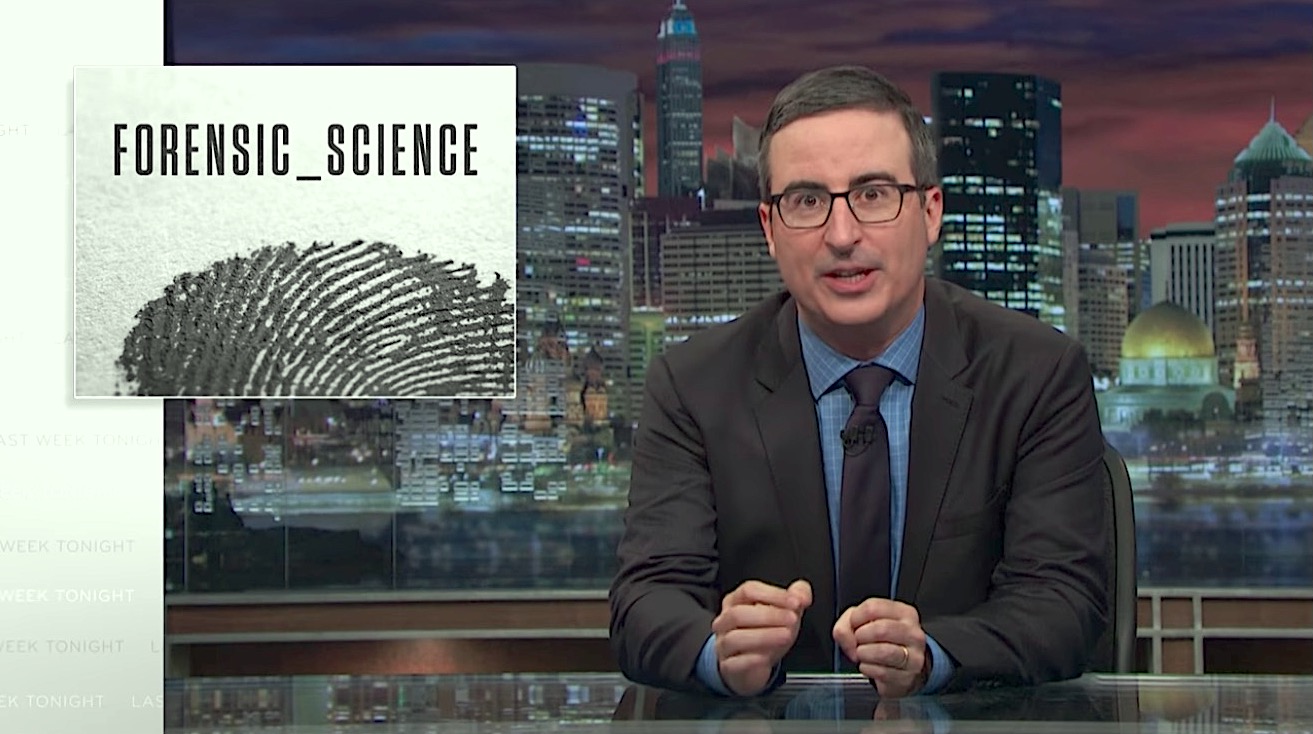John Oliver takes the law into his own hands to fight junk forensic 'science,' since Trump won't


A free daily email with the biggest news stories of the day – and the best features from TheWeek.com
You are now subscribed
Your newsletter sign-up was successful
"On TV and in real life, forensic science plays an important role in criminal convictions," John Oliver said on Sunday's Last Week Tonight, but not all forensic science is as reliable as we've been led to believe by TV shows. Jurors don't always know that, but they expect forensic proof — what prosecutors call the "CSI effect." Since Oliver had a lot of potential jurors watching, he took a few minutes to educate, entertainingly.
"It's not that all forensic science is bad, because it's not," Oliver said. But there are serious documented problems with bite-mark and hair analysis, and some people convicted on such evidence have been executed. More sound forensic sciences like fingerprint and DNA analysis are "by no means infallible," either, he said, giving some examples. And since judges allow evidence based on precedence, not science, "decisions about the validity of science are being made by people who don't necessarily know much about it," he noted.
Finally, some forensic labs are pretty tight with law enforcement, letting bias creep in. "They are supposed to be neutral," not part of the "team" getting bad guys, Oliver said. "If a referee started participating in a team's end-zone celebration, you'd have some serious f---ing questions." He gave a surprise shout-out to Texas for leading the way on quashing "junk" evidence, and said there is a National Commission on Forensic Science that was set up to advise the Justice Department on how to avoid bad science, or was — Attorney General Jeff Sessions shut it down in April. "We may honestly be actively going backwards on this issue," making it likely that innocent people will be locked up and dangerous criminals allowed to roam free, Oliver said, and if the Trump administration won't help, he had a different kind of CSI clip for potential jurors (it has some NSFW language). Watch below. Peter Weber
The Week
Escape your echo chamber. Get the facts behind the news, plus analysis from multiple perspectives.

Sign up for The Week's Free Newsletters
From our morning news briefing to a weekly Good News Newsletter, get the best of The Week delivered directly to your inbox.
From our morning news briefing to a weekly Good News Newsletter, get the best of The Week delivered directly to your inbox.
A free daily email with the biggest news stories of the day – and the best features from TheWeek.com
Peter has worked as a news and culture writer and editor at The Week since the site's launch in 2008. He covers politics, world affairs, religion and cultural currents. His journalism career began as a copy editor at a financial newswire and has included editorial positions at The New York Times Magazine, Facts on File, and Oregon State University.
-
 Political cartoons for February 14
Political cartoons for February 14Cartoons Saturday's political cartoons include a Valentine's grift, Hillary on the hook, and more
-
 Tourangelle-style pork with prunes recipe
Tourangelle-style pork with prunes recipeThe Week Recommends This traditional, rustic dish is a French classic
-
 The Epstein files: glimpses of a deeply disturbing world
The Epstein files: glimpses of a deeply disturbing worldIn the Spotlight Trove of released documents paint a picture of depravity and privilege in which men hold the cards, and women are powerless or peripheral
-
 ‘One Battle After Another’ wins Critics Choice honors
‘One Battle After Another’ wins Critics Choice honorsSpeed Read Paul Thomas Anderson’s latest film, which stars Leonardo DiCaprio, won best picture at the 31st Critics Choice Awards
-
 A peek inside Europe’s luxury new sleeper bus
A peek inside Europe’s luxury new sleeper busThe Week Recommends Overnight service with stops across Switzerland and the Netherlands promises a comfortable no-fly adventure
-
 Son arrested over killing of Rob and Michele Reiner
Son arrested over killing of Rob and Michele ReinerSpeed Read Nick, the 32-year-old son of Hollywood director Rob Reiner, has been booked for the murder of his parents
-
 Rob Reiner, wife dead in ‘apparent homicide’
Rob Reiner, wife dead in ‘apparent homicide’speed read The Reiners, found in their Los Angeles home, ‘had injuries consistent with being stabbed’
-
 Hungary’s Krasznahorkai wins Nobel for literature
Hungary’s Krasznahorkai wins Nobel for literatureSpeed Read László Krasznahorkai is the author of acclaimed novels like ‘The Melancholy of Resistance’ and ‘Satantango’
-
 Primatologist Jane Goodall dies at 91
Primatologist Jane Goodall dies at 91Speed Read She rose to fame following her groundbreaking field research with chimpanzees
-
 Florida erases rainbow crosswalk at Pulse nightclub
Florida erases rainbow crosswalk at Pulse nightclubSpeed Read The colorful crosswalk was outside the former LGBTQ nightclub where 49 people were killed in a 2016 shooting
-
 Trump says Smithsonian too focused on slavery's ills
Trump says Smithsonian too focused on slavery's illsSpeed Read The president would prefer the museum to highlight 'success,' 'brightness' and 'the future'
